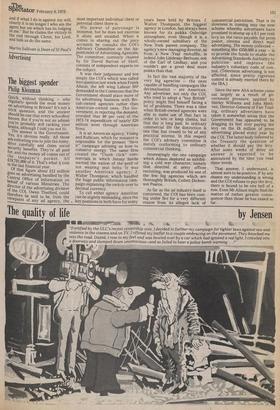Advertising
The biggest spender .
Philip Kleinman
Quick, without thinking — who regularly spends the most money on advertising in Britain? It's not a trick question, and the answer Should be one that every-schoolboy knows. But if you're not an adman You're probably still racking your brains, although I told you not to.
The answer is the Government. Yes, it's obvious really. All those ads exhorting you to join the Army, drive carefully and claim social security benefits. They're all paid for, and the money all comes out of the taxpayer's pocket. All £19,791,000 of it. That's what it cost in the last financial year. Of that figure about £12 million goes on advertising handled by the Central Office of Information on behalf of various Ministries. The director of the advertising division of the COI, Owen Thetford, could therefore be said to be, from the viewpoint of any ad agency, the
most important individual client or potential client there is.
His power of patronage is immense, but he does not exercise it alone and unaided. When it comes to sharing out the juicy accounts he consults the COI's Advisory Committee on the Appointment of Advertising Agencies. The committee, currently chaired by Sir David Barran of Shell, consists of independent experts on the subject. It was their judgement and not simply the COI's which was called into question last week when Frank Allaun, the left wing Labour MP demanded in the Commons that the Government should place more of its advertising business with British-owned agencies rather than American-owned ones. The Government, in rejecting the demand, revealed that 40 per cent of the 1973-74 expenditure of nearly £20 million went through American firms.
It is an American agency, Young and Rubicam, which for instance is responsible for the present "Save it" campaign advising us how to conserve energy. The same firm created the "Clunk click" commercials in which Jimmy Savile warned the nation of the peril of not wearing seat belts. It was another American agency, J. Walter Thompson, which handled the huge public information campaign explaining the switch-over to decimal currency.
To call either agency American can be slightly misleading, since the key positions in both have for many
years been held by Britons. J. Walter Thompson, the biggest agency in London, has always been known for its pukka Oxbridge atmosphere, even though it is a wholly-owned subsidiary of the New York parent company. The agency's new managing director, as from a New Year reshuffle, is indeed John Lindesay-Bethune, son of the Earl of Lindsay, and you couldn't get a great deal more pukka than that.
In fact the vast majority of the very big agencies — the ones capable of handling campaigns like decimalisation — are American. Any advertiser, not only the COI, who tried to adopt a "buy British" policy might find himself facing a lot of problems. There was a time when British-owned agencies were able to make use of that fact in order to win or keep clients, but that day is long past. In ordinary commercial life the distinction is one that has ceased to be of any practical interest. In this respect the COI's advisory committee is merely conforming to ordinary commercial thinking.
Interestingly the one campaign which Allaun deplored as exhibiting a cold war character, namely that directed at army officer recruiting, was produced by one of the few big agencies which are thoroughly British, Collett Dickenson Pearce.
As far as the ad industry itself is concerned, the COI has been coming under fire for a very different reason from its alleged lack of commercial patriotism. That is its slowness in coming into the new scheme whereby advertisers have promised to stump up a 0.1 per cent levy on the rates payable for press poster, cinema and direct mail advertising. The money collected — something like £350,000 a year — is to provide the funds to enable the Advertising Standards Authority to publicise and improve the industry's voluntary code of control. (Television advertising is not affected, since pretty rigorous control is already exerted there by the IBA.) Since the new ASA scheme came out largely as a result of government pressure, applied by Shirley Williams and John Methyen, Director-General of Fair Trading, ordinary advertisers have taken it somewhat amiss that the Government has appeared to be dragging its feet over paying the levy on the £8 million of press advertising placed every year by the COI. The latter body referred to the Treasury the question of whether it should pay the levy. After some weeks of delay an answer is expected to be announced by the time you read these words.
That answer, I understand, is almost sure to be positive. If by any chance my understanding is wrong and the COI refuses to pay the levy, there is bound to be one hell of a row. Even Mr Allaun might find the matter of rather greater consequence than those he has raised so far.


































 Previous page
Previous page